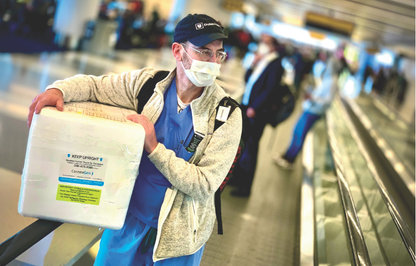
Improving the viability of donated organs in transit from the donor to the recipient has the potential to greatly increase the number and success of solid organ transplant procedures. Collaborative research between Duke surgical scientists and clinicians aims to use gene therapy to enhance the function of donated organs for transplant.
Two basic science researchers in Duke Surgery’s Division of Surgical Sciences—Dawn Bowles, PhD, Assistant Professor in Surgery, and Aravind Asokan, PhD, Professor in Surgery—are studying gene therapy’s applications in transplantation. Their work focuses on harnessing viruses as tools to deliver genetic instructions to targeted tissues, and examining the impacts of these therapies on organ function and immune tolerance.
Dr. Asokan and Andrew Barbas, MD, Associate Professor of Surgery, recently published an article in Nature Biomedical Engineering that describes the discovery of adeno-associated virus (AAV) vectors specifically designed for kidney gene delivery, which open “approaches for ex vivo genetic modification of kidneys to improve transplant outcomes,” Dr. Asokan wrote in a Nature Reviews Nephrology research highlight.
“One of the goals we have as a lab is to get the gene therapy good enough to reduce the amount of immunosuppression necessary below these injurious thresholds that are currently necessary,” says Ben Hughes, PhD, Senior Research Associate in Dr. Bowles’ lab.
“We started with small animal models of liver and lung transplantation to establish the concept of, if you deliver gene therapy to the organ and then transplant it, what are you going to see?” says Dr. Barbas. “Down the road, our hope is to address specific genes of interest that will improve transplant outcomes and specifically reduce organ rejection rates.”